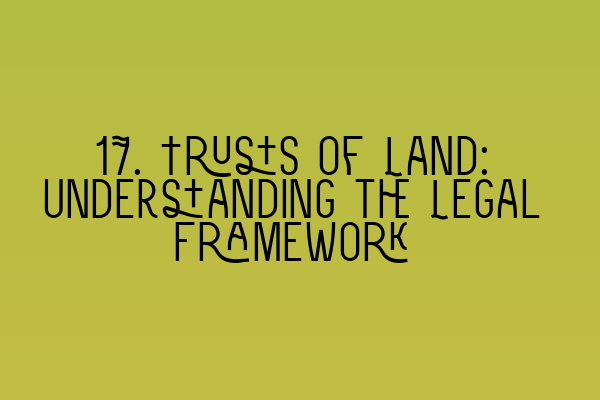17. Trusts of Land: Understanding the Legal Framework
When it comes to property matters, trusts of land play a crucial role in determining ownership and managing assets. Whether you are a property owner, investor, or legal professional, understanding the legal framework surrounding trusts of land is essential. In this article, we will dive deep into the intricacies of trusts of land and provide you with a comprehensive understanding of their significance.
What is a Trust of Land?
A trust of land, also known as a TOLATA trust, is a legal arrangement where a property is held by one or more trustees for the benefit of one or more beneficiaries. This type of trust can be created either explicitly, through a trust deed, or implicitly, through actions and conduct that imply a trust relationship. A trust of land can be set up for various purposes, including protecting assets, managing property rights, and ensuring fairness in property distribution.
Trusts of land are governed by the Trusts of Land and Appointment of Trustees Act 1996, often referred to as TOLATA. This legislation sets out the legal framework for creating, managing, and resolving disputes related to trusts of land.
The Legal Framework for Trusts of Land
The Trusts of Land and Appointment of Trustees Act 1996 provides a clear legal framework for understanding the rights and responsibilities of trustees, beneficiaries, and other parties involved in a trust of land.
Under TOLATA, trustees have a fiduciary duty to act in the best interests of the beneficiaries and to manage the trust property diligently. The Act sets out the powers and duties of trustees, such as the power to lease, sell or mortgage the trust property, subject to certain limitations and permissions.
TOLATA also addresses the rights of beneficiaries, including their right to occupy the trust property, seek an order for sale, or request the court to vary the terms of the trust. The Act provides a mechanism for resolving disputes, such as applications for sale, partition, or injunctions, through the court system.
The Importance of Trusts of Land
Trusts of land are fundamental in property law and have several key benefits:
- Asset Protection: By transferring property into a trust, individuals can protect their assets from various risks, such as creditors, divorce settlements, or bankruptcy proceedings.
- Estate Planning: Trusts of land offer a flexible tool for estate planning, allowing individuals to control the distribution of their property and ensure it benefits their chosen beneficiaries.
- Co-Ownership Management: In cases where multiple individuals own a property, a trust of land can help manage the co-ownership relationship, clarify the rights and responsibilities of each party, and provide a mechanism for resolving disputes.
Looking for SQE exam practice questions? Check out our article on SQE 1 Practice Exam Questions to enhance your preparation.
Resolving Disputes in Trusts of Land
Despite the clear legal framework provided by TOLATA, disputes in trusts of land can still arise. Such disputes often involve disagreements over the management of the trust property, the distribution of rent or profits, or the sale or transfer of the property.
In case of a dispute, it is advisable to seek professional legal advice to understand your rights and options. Mediation and negotiation should be explored as a first step in resolving disputes, as courts usually encourage parties to reach an amicable agreement. If an agreement cannot be reached, the court can intervene and make orders regarding the sale, partition, or management of the trust property.
Preparing for the SQE exams? Check out our comprehensive SQE 2 Preparation Courses and SQE 1 Preparation Courses to maximize your chances of success.
In Conclusion
Trusts of land are an integral part of property law, providing individuals with various benefits like asset protection, estate planning, and co-ownership management. Understanding the legal framework surrounding trusts of land is crucial for property owners, investors, and legal professionals alike.
Curious about the upcoming SRA SQE exam dates? Visit our article on SRA SQE Exam Dates for more information.
If you require assistance with trusts of land or any other property law matters, our expert team at SQE Property Law & Land Law is here to help. Contact us today for professional and personalized advice.
